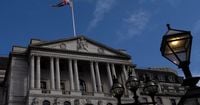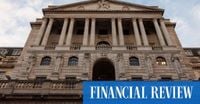The Bank of England has cut its main interest rate by a quarter of a percentage point to 4.25% on Thursday, May 8, 2025, marking its fourth reduction in less than a year. This decision comes amidst concerns over sluggish economic growth and the impact of U.S. President Donald Trump's tariffs on global trade. Despite the cut being widely anticipated, the Monetary Policy Committee (MPC) was unexpectedly divided, voting 5-4 in favor of the reduction.
Prior to the Bank’s decision, markets had priced in expectations for around three more cuts this year, which would have taken interest rates down to 3.5%. However, following the MPC's latest decision, traders are now anticipating only two additional cuts, with a 40% chance of a third. This shift reflects a more cautious outlook among investors, who were spooked by the split within the MPC, which revealed differing opinions among rate-setters.
Sanjay Raja, an economist at Deutsche Bank, described the split as indicative of a “more divided MPC.” He noted, “For all the hype, the MPC basically took a step back to where they were a month or two ago.” This sentiment was echoed by analysts from Goldman Sachs, who were surprised by the Bank's commitment to a “gradual and careful” approach to rate cuts, suggesting that the minutes from the meeting were “more hawkish” than anticipated.
The MPC's decision was not without contention. Swati Dhingra and Alan Taylor voted for a more substantial cut of 50 basis points, while Chief Economist Huw Pill and Catherine Mann advocated for holding rates steady. The minutes of the meeting indicated that most members who voted for the cut viewed the decision as finely balanced, while others believed the case for a reduction had been clear even before recent global developments.
The Bank of England's Governor, Andrew Bailey, emphasized the need for a cautious approach in light of the unpredictable global economic landscape. "The past few weeks have shown how unpredictable the global economy can be," he explained. "That's why we need to stick to a gradual and careful approach to further rate cuts. Ensuring low and stable inflation is our top priority."
The Bank's decision to cut rates is expected to bring some relief to borrowers, businesses, and consumers. For the approximately 591,000 homeowners in the UK on a tracker mortgage rate, the reduction translates to an average savings of £29 per month. According to UK Finance, a typical customer could save around this amount, providing some much-needed financial relief.
However, the rate cut presents a mixed bag for savers, who may see diminished returns on their savings accounts as interest rates decline. As of Thursday, the average two-year fixed mortgage rate was 4.66%, while the average five-year fixed rate was 4.61%. The Bank's decision is expected to support sentiment in the housing market at a time when affordability has been stretched and buyer activity has slowed.
Despite the rate cut, concerns linger regarding the broader economic implications of U.S. trade policies. The Bank of England noted that the uncertainty surrounding global trade policies has intensified since the imposition of tariffs by the U.S. and subsequent retaliatory measures. The MPC forecasts that these trade tensions could shave 0.3% off UK GDP over the next three years, highlighting the potential impact on economic growth.
Inflation has cooled to 2.6% in the twelve months leading up to March, down from 2.8% the previous month. However, the Bank expects a temporary spike in inflation to 3.5% later this year due to rising energy costs and other regulated price increases. Bailey reiterated that the MPC must remain vigilant in responding to evolving economic circumstances and the outlook for inflation.
Looking ahead, market analysts are now pricing in a less than 20% chance of a rate cut in June, with expectations that further cuts could occur later in the year. Some economists believe that the Bank may need to reassess its strategy depending on how the economy responds to current trade tensions and inflationary pressures.
In light of these developments, businesses and consumers alike are hoping for a boost in confidence and spending. The Bank's decision to cut rates is seen as a potential catalyst for increased investment and economic activity, particularly among the UK’s 5.5 million small and medium-sized enterprises, which have faced challenges from rising costs and economic uncertainty.
As the Bank of England navigates this complex economic landscape, it remains committed to a policy of gradual and careful rate adjustments. The MPC's recent decision underscores the delicate balance policymakers must strike between supporting growth and managing inflationary pressures. With many moving parts in the global and domestic outlook, the future trajectory of interest rates remains uncertain, but the Bank's cautious approach reflects its commitment to ensuring economic stability.





